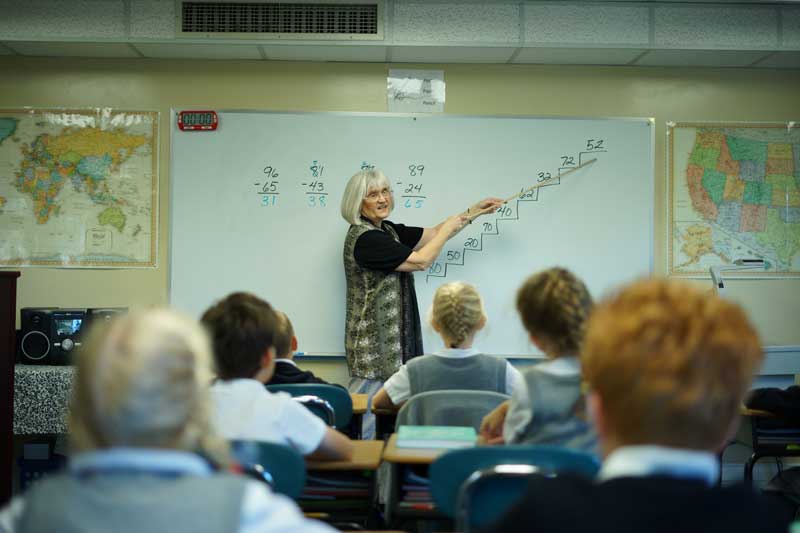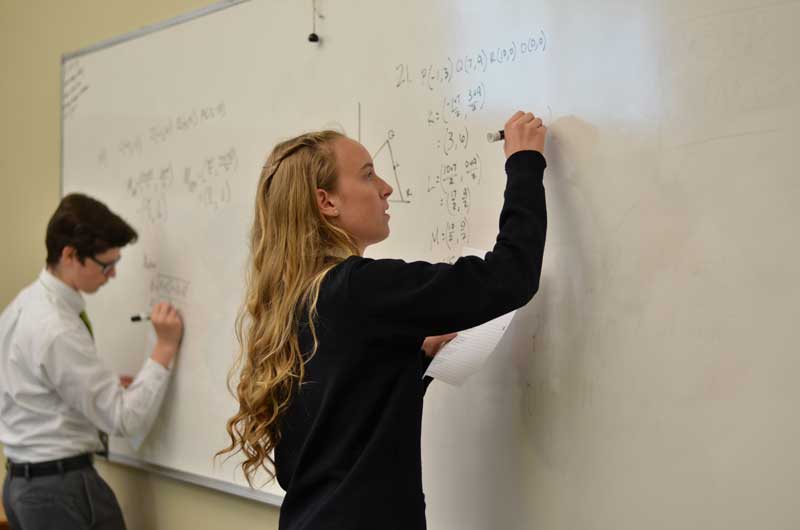Mathematics

Because mathematics, music, and Latin are the three universal languages, they are given a special emphasis in classical education and are required of all students every year. Mathematics, like all languages, is cumulative, rigorous, and demanding; it develops logical, accurate, and precise thinking habits. Mathematics is the language of science and the indispensable tool for the study of the natural world. The key to success in all sciences, especially chemistry and physics, is a good math education.
Arithmetic is the art of counting and calculation. Like the Latin Grammar, arithmetic is concrete, is based on memorization, and is a small and finite subject. These characteristics make arithmetic appealing to the child’s mind because it is something he can understand and over which he can achieve mastery. In the trivium model of learning, arithmetic is the focus of grades K-6. Next to the alphabet, arithmetic is the most useful tool students will ever possess. It should not be rushed over in a hurry to get to higher mathematics. Games, drills, skip-counting, cypher drills, and challenge problems make arithmetic an enjoyable part of the school day.
Mathematics, on the other hand, is the science and philosophy of relationships. It is a large and varied subject that includes many topics, such as algebra, geometry, and calculus. Topics from the world of mathematics are suitable for students who have reached the age of abstract thinking in middle and high school.
Modern textbooks do not observe the distinction between arithmetic and mathematics. Algebra topics are included in texts as early as kindergarten and obscure the necessary arithmetic skills for each grade. The energy and effort of students are dissipated over a variety of topics, many of which are too abstract for students to understand. Insufficient time is given to basic skills, and students do not experience the satisfaction of mastery learning, nor are they adequately prepared for higher math.
Mathematics is an exact language, one that is unrelenting and unforgiving. A failure to master basics is the cause of the glass ceiling that most students experience in their mathematics education. Students must overlearn basic math skills in K-6 if they are to be successful in high school math.

Our textbooks and teaching strategies at HLS ensure that students learn arithmetic and mathematics in an age-appropriate scope and sequence, eliminating the aforementioned deficiencies so prevalent in modern mathematics education.
Our textbooks are carefully chosen, and our teachers are committed to the goals of mastery learning in arithmetic and mathematics. We have found the Rod and Staff math textbooks to be the most closely aligned with our goals in K-6. Seventh grade is an important year that prepares students for algebra in 8th grade. Our pre-algebra text is from College of the Redwoods, Department of Mathematics. For Algebra I and II, we use the Prentice Hall Classics text, for Geometry, the McDougal Littell text, and for Pre-Calculus and Calculus, the Larson Hostetler text. Our goal is for all able students to complete AP Calculus; students who take AP Calculus in 11th grade take Calculus III as seniors.
- 7th Grade: Pre-Algebra
- 8th Grade: Algebra I
- 9th Grade: Algebra II
- 10th Grade: Geometry
- 11th Grade: Pre-Calculus or AP Calculus
- 12th Grade: AP Calculus / Calculus III *
* Strong math students take pre-calculus their sophomore summer and AB or BC Calculus their junior year. Students completing BC Calculus their junior year typically take Calculus III.